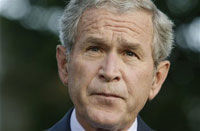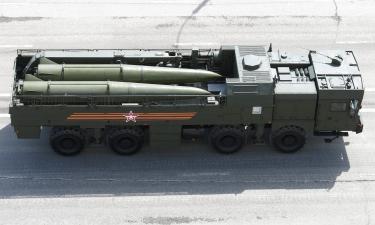Bush believes bailout cost to be much less than 700 billion dollars
Key supporters of a Wall Street bailout package prodded lawmakers to approve the plan hours ahead of a difficult House vote on Monday, with President George W. Bush saying it is needed to "keep the crisis in our financial system from spreading throughout our economy."

"Every member of Congress and every American should keep in mind that a vote for this bill is a vote to prevent economic damage to you and your community," said Bush, fully aware that congressional passage of the $700 billion compromise legislation is far from assured.
"With this strong and decisive legislation," he said, "we will help restart the flow of credit so American families can meet their daily needs and American businesses can make purchases, ship goods and meet their payrolls."
Two leading players in the negotiations also spoke early Monday, taking to television news shows to lobby for approval of a package deeply unpopular with a public angry that taxpayer money will save Wall Street firms from heavy risk-taking. Thousands of angry phone calls, e-mails and letters have poured into lawmakers' offices from constituents.
Democratic Sen. Chris Dodd said that failure to act would spread the contagion of frozen credit markets even further. "This is not just about Wall Street," said the Banking Committee chairman.
Sen. Judd Gregg, who represented fellow Republicans in the hard-fought 10 days of talks that culminated in a deal early Sunday morning, called it a "tourniquet" for the ailing financial industry and slow-moving economy.
Still, both men said the necessity of such massive government action is a sad day for the country. Asked if the legislation, slated for a vote in the House later Monday and a Senate vote as early as Wednesday, would pass, Dodd said only: "We hope so."
These players were speaking not just to rank-and-file lawmakers to whom the spotlight now turns in this contentious, dramatic debate, but to U.S. and global markets which have displayed nervousness about Washington's determination to act.
Investors worldwide and in early trading in the United States continued to show doubt about whether the bill would go through, much less go a long way toward curing the systemic problems that have unnerved financial markets across the globe for weeks.
Bush said he "fully understands" it is a difficult vote for lawmakers.
But he argued that jittery U.S. taxpayers will benefit from a number of safeguards that lawmakers wrote into the pending legislation, including checks and balances on the operation of the program, curbs on "golden parachutes" for top executives of firms getting help, and assurances that taxpayers would ultimately be reimbursed by the companies for any losses. But the government would have broad discretion to decide how to implement both. The legislation also requires that the government take ownership stakes in companies that receive federal infusions, so it could share a piece of potential future profits.
Bush also said the ultimate cost of the bailout will be much less than the $700 billion authorized in the bill. The sour assets - mostly mortgage-backed securities - that the program allows the government to take off the books of struggling financial institutions will eventually be sold, perhaps even at a profit.
Still, the president hinted that this may not be the last intervention required.
"It's been a volatile time for our financial system and our economy," he said. "Even with the important steps we're taking to address the current crisis, we will continue to face serious challenges."
Treasury Secretary Henry Paulson sought the unprecedented amount of money with little supervision.
Instead, the bill lets Congress block half the money and force the president to jump through some hoops before using it all. The government could get at $250 billion immediately, $100 billion more if the president certified it was necessary, and the last $350 billion with a separate certification - and subject to a congressional resolution of disapproval. Still, the resolution could be vetoed by the president, meaning it would take extra-large congressional majorities to stop it.
Banks, credit unions, securities brokers and dealers, and insurance companies, among others, could get the help as long as they had "significant operations" in the United States. Originally designed to help companies get rotten mortgage-related investments off their balance sheets, the legislation would allow the government to buy up any kind of asset top economic officials think is necessary to promote market stability.
The final 110-page bill was released Sunday evening after a final weekend of intense negotiating, and Republicans and Democrats huddled for hours in private meetings Sunday night to learn its details and voice their concerns. Many said they left uncertain of how they would vote.
Lawmakers in both parties who are facing re-election are particularly nervous about embracing such a costly plan proposed by a deeply unpopular president that would benefit perhaps the most publicly detested of all: companies that got rich off bad bets.
"Nobody wants to have to support this bill," said Republican Rep. John A. Boehner, the House minority leader. But he said he was urging "every member whose conscience will allow them to support this" to do so. Officials in both parties expected the vote to be a nail-biter.
The two major party presidential candidates - Republican John McCain and Democrat Barack Obama - expressed tepid support for the bailout.
Republican Rep. Joe Barton, an opponent, estimated that half of the House's 199 Republicans are "truly undecided."
Democratic Rep. Elijah Cummings said he was inclined to oppose the bill. But he added: "A lot of people are going to hold their nose and vote for it, because they've been put in a bad position and they don't have any other option."
Subscribe to Pravda.Ru Telegram channel, Facebook, RSS!





